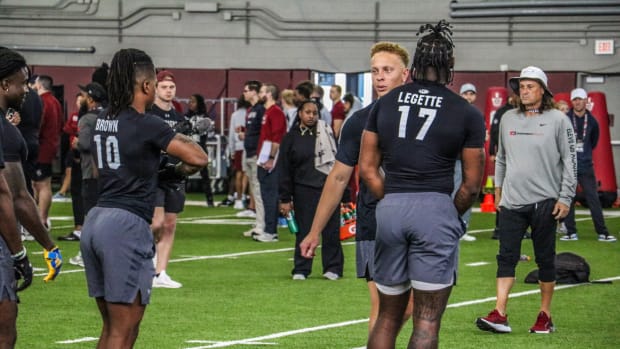LSU AD Wanted Les Miles Fired in 2013 After Sexual Misconduct Accounts
LSU released a lengthy report from law firm Husch Blackwell on Friday, detailing how the university handled past accounts of sexual misconduct and domestic assault, including sexual misconduct allegations against former head football coach Les Miles.
Miles was banned from being alone with woman students following a 2013 investigation, according to an original internal report recently released by LSU. The initial report alleged Miles texted woman student workers on a burner phone, drove them alone to his condo and kissed a student on at least one occasion. Miles, who was directly involved with hiring student employees, reportedly "made it clear that he wanted these employees to have a certain 'look' (attractive, blond, fit)." Employees at the time that did not fit the description were to be given fewer hours or fired, according to the report.
Husch Blackwell found that the LSU athletic department did not respond properly to the accounts about Miles.
"We are not in a position to offer an opinion on whether the allegations are true or not," Husch Blackwell's report reads. "Instead, this issue is whether the University responded to this report against [Miles] ... in a manner consistent with then-existing legal guidance, well recognized best practices and institutional policy. The answer is 'no.' "
The law firm's report said that former athletic director Joe Alleva recommended Miles be fired for cause in 2013, citing "insubordination, inappropriate behavior, putting the university, athletic dept and football program at great risk."
LSU hired Husch Blackwell to conduct an independent review of the university's overall Title IX reporting process following a USA Today report last fall on how the LSU athletic department and broader administration failed to adequately address sexual misconduct allegations against top athletes and other students. The law firm interviewed nearly 50 current and former university employees, students, witnesses and other university community stakeholders during its investigation.
In response to the report, LSU announced a 30-day unpaid suspension for executive deputy athletic director Verge Ausberry and a 21-day unpaid suspension for senior associate athletic director Miriam Segar. Both will be required to go through training on sexual assault and domestic violence cases and more.
Ausberry and Segar have been described as failing to properly handle reports of sexual misconduct and domestic violence among athletes. LSU president Tom Galligan told the board that disciplinary action was justified based on Husch Blackwell's report.
In addition to Husch Blackwell's recommendations, LSU plans to implement seven new items related to the Title IX reporting process. These additions include clarifying reporting responsibilities and policies, as well as enhancing oversight and evaluation.
Kansas, where Miles is currently the head coach, reportedly placed Miles on administrative leave Friday evening.
The allegations against Miles are the latest Title IX violations that LSU is facing.
According to a November USA Today report, a member of the LSU diving team told her coach and an athletic department administrator in spring 2016 that then star running back Derrius Guice raped her friend after she passed out drunk at a party. That summer, a student told two athletics administrators that Guice took a partially nude photo of her without her permission and later showed it to the team equipment manager and possibly others.
In April 2017, the athletic department received reports of a second account of rape against Guice.
Although LSU is supposed to report allegations to the Title IX office, USA Today said it found that officials from the athletic department and the school failed to investigate some reports or take them seriously, in certain cases ignoring them.
USA Today also reported that at least seven LSU officials had knowledge of then wide receiver Drake Davis's physically abusing his girlfriend, a member of the women's tennis team. They reportedly "sat on the information for months, while Davis continued to assault and strangle her."
The tennis player, Jade Lewis, publicly came forward last year and addressed how the school handled multiple reports of her being abused by Davis. Lewis said LSU women's tennis co–head coach Julia Sell failed to report Lewis's account of physical abuse by Davis. Four other members of the tennis team separately informed Sell of the abuse, which occurred between May 2017 and August 2018, Lewis said.
Lewis reportedly told police and USA Today that Davis left her bruised or bleeding on at least six occasions during the time they dated, which lasted for more than a year.
Police arrested Davis in August 2018 on felony charges of second-degree battery against a former girlfriend. LSU, meanwhile, indefinitely suspended Davis from the team, and the judge ordered him to have no contact with the woman. The university expelled him in July 2019—"four months after his criminal conviction, and 10 months after he'd already left the school," according to USA Today.
Following its investigation in November, USA Today reported, "Guice and Davis included, at least nine LSU football players have been reported to police for sexual misconduct and dating violence since coach Ed Orgeron took over the team four years ago, records show. But the details of how LSU handled complaints against [another] seven, including two who played key roles on its 2020 national championship team, remain largely secret."
At Friday's meeting before LSU's board of supervisors, Scott Schneider of Husch Blackwell addressed the history of Title IX issues at the school.
"From a historical perspective, LSU has been very slow to develop policies and infrastructure and personnel. ... We are very critical throughout this report of the Title IX office. … Up until today, the university's Title IX office has never been staffed appropriately," said Schneider, per The Advocate's Andrea Gallo.
Schneider added: "It felt as if this system, this process was designed to put victims in a position where they gave up."






